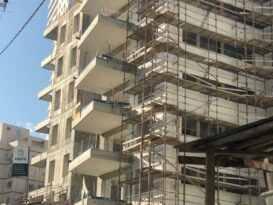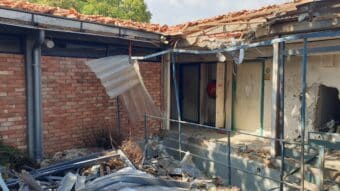Amid the trade war launched by President Donald Trump and stock market crashes worldwide, the real estate market (in Israel) is currently engulfed mainly in confusion. Alongside expectations that investors will shift money from the capital markets to real estate and predictions that interest rates will fall, it is clear to everyone that the business world is becoming more dangerous and complex.
By Dror Nir Kastel, Nadlan Center
The “tariff bomb” dropped overnight between Wednesday and Thursday by U.S. President Donald Trump on most countries worldwide, including Israel, triggered global stock market crashes. In the two trading days since, the S&P 500 index fell by 9.1%, marking its worst week since the coronavirus crisis in March 2020. The Dow Jones dropped by 7.9%, and the Nasdaq by 10%.
The trading week in Tel Aviv also opened with sharp declines, with the TA-35 index down 3.9% and the TA-125 losing about 3.8%. Sharp declines were also recorded in Far Eastern stock markets, and the burning question today is how this massive upheaval will affect Israel’s real estate market, which has already reached this point exhausted and unstable after a year and a half of war.
According to Rotem Zilber, a partner at a large accounting firm and a lecturer in real estate investments at Bar-Ilan University, the real estate index dropped moderately. He states, “While the Tel Aviv Stock Exchange closed with sharp declines in almost all sectors, real estate indices stand out with relatively moderate declines.” For example, the Tel Aviv Insurance index fell by 4.88%, the Tel Aviv Technology index by 4.71%, the Tel Aviv Oil and Gas index by 4.46%, while the Tel Aviv Real Estate index fell “only” by 2.91%, the TA-Income Israel index by 2.89%, and the TA-Income Abroad index by 2.43%. Even the Tel Aviv Construction index dropped less than average at 3.49%.
Rotem Zilber explains, “These figures are not coincidental. They may indicate a perception of relative stability in the real estate market, at least in the short term, compared to sectors associated with higher risk during periods of uncertainty, such as technology or finance.”
On the other hand, tariffs could increase construction costs and make it harder for real estate companies to raise capital. “In my opinion, in the short term, we might even benefit. If Israel does not join the U.S. tariffs, surplus goods from China not reaching the American market may come to us at competitive prices. This could actually lower raw material costs and ease the burden on contractors and developers.
Regarding stock values, Zilber says, “True, some controlling shareholders sometimes use shares as collateral, but that’s not the main point. Most real estate market financing is based on senior debt, backed by the value of the real estate itself. Therefore, the drop in stock values is not expected to significantly impact activity in the sector. In simple terms — we are currently seeing an orange swan, not a black one. A lot of noise, but no real trend change on the ground. At this stage, it seems to be a temporary disturbance rather than a structural threat — at least for the Israeli real estate market.”
“Who Even Remembers the Subprime Crisis?”
Haim Feiglin, Deputy President of the Contractors and Builders Association and Deputy CEO of Zemach Hammerman, refuses to be alarmed. “As a real estate professional, I look fifteen years ahead. Things like stock market crashes, interest rate changes, or any dramatic headline are background noise I use to my advantage. In 1979, I graduated from the Technion as a civil engineer, and I’ve been in this field for 46 years. As a developer, about 30 years. I’ve been through two or three crises in my life, so I’ve learned.”
“We have experienced many security, political, social, and epidemiological crises and global diseases of all kinds and colors. It’s not that I ignore these, but they are short-term factors. I focus more on the growth of households in Israel and worldwide, urbanization trends, and GDP growth. Dramatic headlines of crises and crashes — we learned to neutralize. These are very loud, very powerful background noises, and I tend to think that in a year, two, or three, we won’t even talk about them.”
“The 2008 subprime crisis — who even remembers it? The crisis was intense, and there was indeed a year of recession. Then came a year of overconfidence and euphoria, so you have to learn not to fall into despair.”
So, no actions are needed now? “Of course, actions are needed, and these are actions that are always correct. One must be very cautious on one hand and very attentive and open to business opportunities that always arise during such crises.”
“Everyone Will Be Even More Cautious”
Adi Nov, CEO of ICIC Credit Insurance (owned by Allianz and Harel), distinguishes how development and construction companies are affected by the situation. “Development companies now see two things: first, growing uncertainty. It is very difficult to plan operations in companies whose short-term horizon is three to five years. Projects are not something you can shift every quarter, which means it is very difficult to commit to projects, raising concerns about the number of construction starts and responsiveness to infrastructure initiatives, especially if they don’t protect developers’ input costs.”
Nov continues, “On the flip side, the expected slowdown in the U.S., which is the current forecast, increases the likelihood of interest rate cuts there, which would lead to faster rate cuts here. This is actually an upside for development companies because a decrease in the cost of money will benefit them.”
Regarding construction companies, she says: “Construction companies here are already very worn out because operating under uncertainty is extremely difficult. They reached the current situation from a very complex place, with high interest rates persisting for a long time, a shortage of workers, and a significant rise in labor costs. All these heavily impact availability and profit margins, while in the past year and a half, there has been a drop in construction starts, affecting supply and demand. There isn’t enough demand for what they offer. This creates a gap that is hard to bridge financially. Adding the pressure from rising input costs — since tariffs, like any supply chain change, generate an increase in input costs — puts even more pressure on them and makes their situation even more complicated.”
So, what should real estate companies do now?
“It’s hard to assess because we are in the middle of the process. The government is taking action, and we need to patiently wait a week or two to see what the real outcome of Trump’s announcements will be. Assuming the situation remains as it appears today, based on the announcements, I estimate it will lead everyone to act even more cautiously than before and to be even more conservative, because ultimately it points to an even more complex market.”

Nadlan Center is Israel’s leading real estate news and knowledge platform in Hebrew, created for industry professionals. Founded by experts in the field, it delivers in-depth, up-to-date coverage on urban renewal, planning and construction, taxation, and housing policy — tailored to the needs of developers, investors, planners, and financiers. In addition to its widely read news content, Nadlan Center hosts major industry events, professional conferences, and training programs that support the growth and development of the Israeli real estate sector.
Learn more: https://www.nadlancenter.co.il







